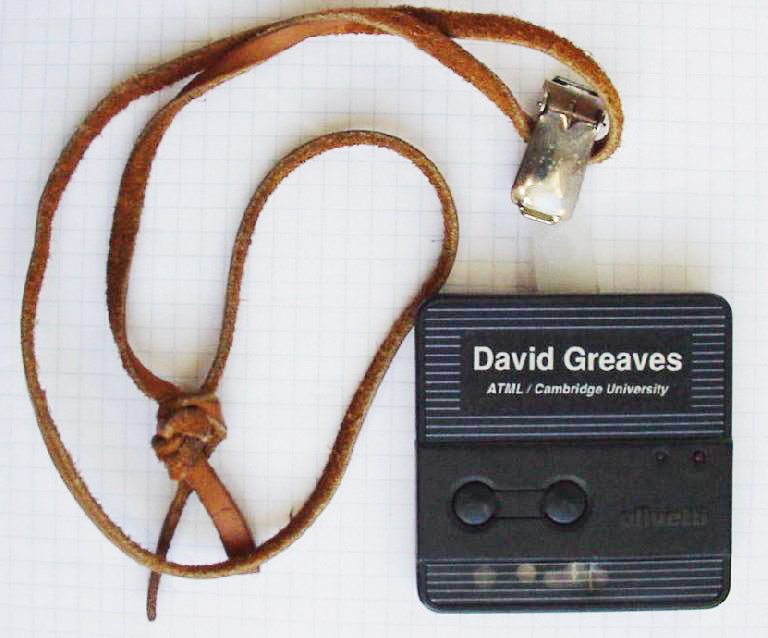Difference between revisions of "Active Badge"
Caseorganic (Talk | contribs) m (moved Active-Badge to Active Badge) |
Caseorganic (Talk | contribs) |
||
| Line 1: | Line 1: | ||
| − | [[image:olivetti-research-active-badge-wearable-computing.jpg|right|500px]] | + | [[image:olivetti-research-active-badge-wearable-computing.jpg|right|thumb|500px|David Greaves' Active Badge from his time at Cambridge University.]] |
===Overview=== | ===Overview=== | ||
| − | The '''Active Badge''' system is an early wearable computer developer by Italian computer manufacturer Olivetti in 1990. <ref>http://www.media.mit.edu/wearables/lizzy/timeline.html#1990b</ref> for research and corporate use. Active Badges badges were worn around the neck and operated only in specially-wired buildings, where each room and door has an infra-red tranceiver to communicate with the badge.<ref>Greaves, David. Olivetti Research Active Badge. 2000. http://koo.corpus.cam.ac.uk/projects/badges/index.html</ref> The Active Badge used using infrared signals to communicate a person's location: Olivetti developed a name badge that transmitted a unique id to IR receivers placed in rooms around a building. This allowed these "smart rooms" to track a person's location and log it in a central database. | + | The '''Active Badge''' system is an early wearable computer developer by Italian computer manufacturer Olivetti in 1990. <ref>Rhodes, Bradley. A Brief History of Wearable Computing. http://www.media.mit.edu/wearables/lizzy/timeline.html#1990b</ref> for research and corporate use. Active Badges badges were worn around the neck and operated only in specially-wired buildings, where each room and door has an infra-red tranceiver to communicate with the badge.<ref>Greaves, David. Olivetti Research Active Badge. 2000. http://koo.corpus.cam.ac.uk/projects/badges/index.html</ref> The Active Badge used using infrared signals to communicate a person's location: Olivetti developed a name badge that transmitted a unique id to IR receivers placed in rooms around a building. This allowed these "smart rooms" to track a person's location and log it in a central database. |
===Active Badge Today=== | ===Active Badge Today=== | ||
Latest revision as of 16:34, 27 January 2013
Overview
The Active Badge system is an early wearable computer developer by Italian computer manufacturer Olivetti in 1990. [1] for research and corporate use. Active Badges badges were worn around the neck and operated only in specially-wired buildings, where each room and door has an infra-red tranceiver to communicate with the badge.[2] The Active Badge used using infrared signals to communicate a person's location: Olivetti developed a name badge that transmitted a unique id to IR receivers placed in rooms around a building. This allowed these "smart rooms" to track a person's location and log it in a central database.
Active Badge Today
Much of what was possible with early wearable computing is now possible with mobile phones. David Greaves wore an Active Badge at Cambridge University to unlock the buildings where he worked and to give out his location.[3]. Although the Active Badge was useful, Greaves mentioned his colleagues "stopped wearing their badges in the office environment once they had a mobile phone".[4]
Related Reading
References
- Jump up ↑ Rhodes, Bradley. A Brief History of Wearable Computing. http://www.media.mit.edu/wearables/lizzy/timeline.html#1990b
- Jump up ↑ Greaves, David. Olivetti Research Active Badge. 2000. http://koo.corpus.cam.ac.uk/projects/badges/index.html
- Jump up ↑ Ibid.
- Jump up ↑ Ibid.
